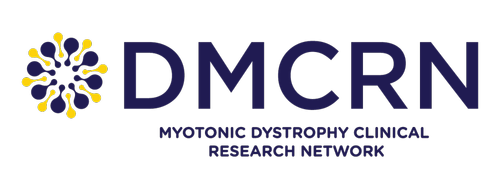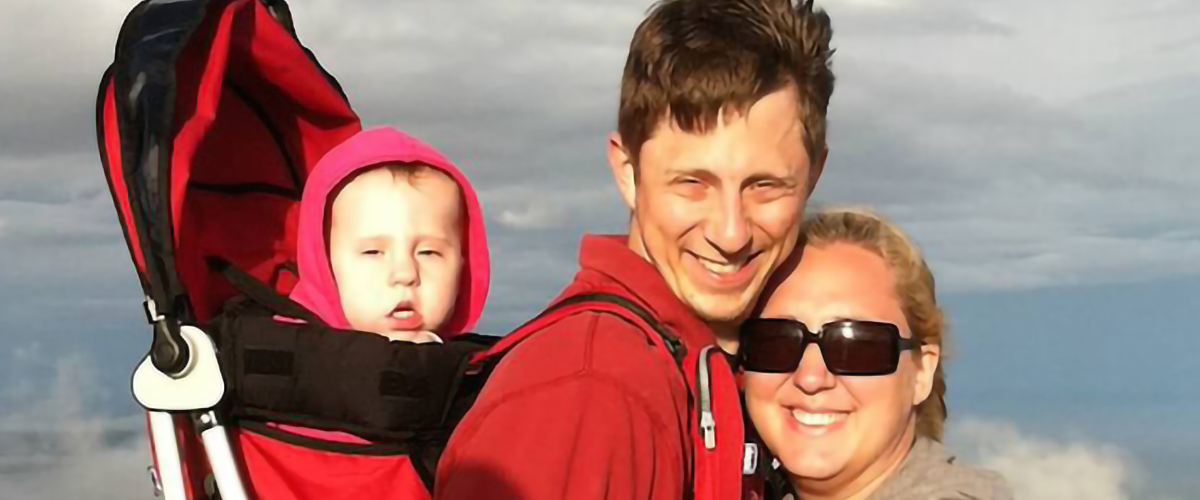
The DMCRN is a global research network advancing clinical studies for myotonic dystrophy (DM).
This page highlights how the network supports trials, tracks disease progression, and connects families and scientists to accelerate treatment development. Learn more about myotonic dystrophy. >>>
Building a Better Future for DM Research, Trials, and Treatment
The Myotonic Dystrophy Clinical Research Network (DMCRN) is a global group of leading medical research centers working together to study and treat myotonic dystrophy (DM), a genetic condition that includes two main types: DM1 and DM2. Launched in 2013 with support from the Myotonic Dystrophy Foundation (MDF), the DMCRN includes over 20 research sites around the world. It plays a key role in preparing for clinical trials, understanding disease progression, and creating standardized tools to study DM.

"The DMCRN makes it possible to run large, coordinated clinical studies that are essential to understanding and treating myotonic dystrophy. By supporting natural history studies, the network helps identify people for clinical trials and discover biomarkers that move us closer to effective therapies."— Dr. Nicholas Johnson, DMCRN Principal Investigator, Virginia Commonwealth University, and MDF Scientific Advisory Committee Member
The DMCRN's Founding Leadership
The DMCRN was founded in 2012 in response to concerns from DM researchers about clinical trial site readiness, standardization of laboratory procedures, and infrastructure needed to match the rapid pace of drug development. With foundational support from MDF and a consortium of academic and industry partners, the University of Rochester—led by Dr. Charles Thornton—spearheaded the creation of the DMCRN.
Dr. Thornton, a world-renowned and highly respected clinician-researcher at the University of Rochester Medical Center, played a central role in establishing the Network’s collaborative model to accelerate clinical trial readiness and therapeutic development. For 15 years, he served as Chair of MDF’s MDF's Scientific Advisory Committee (SAC) and continues to help guide the Foundation’s research direction.
What the DMCRN Does
- Supports Clinical Trials: Builds consistent, high-quality trial sites across institutions.
- Tracks Disease Progression: Conducts long-term studies to understand how DM changes over time.
- Develops Research Tools: Creates better ways to measure symptoms and identify biomarkers.
- Promotes Global Collaboration: Encourages international research teams to share data and resources.
Current Studies in the DMCRN
While the DMCRN is committed to supporting research across both DM1 and DM2, the active studies listed below are specific to DM1 populations.
Adult DM1 Study: END-DM1
This study aims to identify reliable ways to measure symptoms and track the effectiveness of new DM1 treatments.
- Who Can Join: Adults aged 18–70 with confirmed DM1
- What to Expect: Four visits over 24 months that may include physical exams, muscle strength tests, blood work, and cognitive assessments. Some participants may be asked to provide a small, optional muscle sample (smaller than a pea) if they feel comfortable.
- Why It Matters: Helps researchers design better, faster clinical trials
Pediatric DM1 Study: ASPIRE-DM1
This study focuses on young children living with congenital or childhood-onset DM1. Researchers are working to find the best ways to measure how treatments help children over time.
- Who Can Join: Children from birth to 4 years and 11 months with CDM (congenital DM) or ChDM (childhood-onset DM)
- What to Expect: Four visits over 18 months including developmental assessments, motor and cognitive testing, and feedback from parents or caregivers.
- Why It Matters: Supports future trials focused on pediatric treatment options
Global DMCRN Research Sites
The following sites are part of the DMCRN. Some are actively recruiting for specific studies. Please check the DMCRN site directory or reach out to the study contacts to learn more about participation opportunities.
Study Contacts:
- Ruby Langeslay, ruby.langeslay@vcuhealth.org
- Jennifer Raymond, jennifer.raymond@vcuhealth.org
United States:
- University of California, Los Angeles (UCLA) – Los Angeles, CA
- University of California, San Diego (UCSD) – San Diego, CA
- Stanford University School of Medicine – Stanford, CA
- University of Colorado Anschutz Medical Campus – Aurora, CO
- University of Florida, McKnight Brain Institute – Gainesville, FL
- University of Iowa Hospitals & Clinics – Iowa City, IA
- University of Kansas Medical Center Research Institute – Kansas City, KS
- University of Rochester Medical Center – Rochester, NY
- The Ohio State University Wexner Medical Center – Columbus, OH
- Houston Methodist Research Institute – Houston, TX
- UT Health San Antonio – San Antonio, TX
- Virginia Commonwealth University (VCU) – Richmond, VA
International:
- Centro Clinico NeMO – Milan, Italy
- Osaka University – Osaka, Japan
- Radboud University Medical Center – Nijmegen, Netherlands
- Friedrich-Baur-Institute, Ludwig-Maximilians-University – Munich, Germany
- University College London Hospitals (UCLH) – London, UK
- St George's University Hospitals – London, UK
- Auckland City Hospital – Auckland, New Zealand
- Université de Sherbrooke – Sherbrooke, QC, Canada
Why This Matters
The DMCRN connects scientists, clinicians, and families to accelerate research and develop better treatments. Every study, every data point, and every shared story brings us closer to a world with better options—and ultimately, a cure—for people living with DM. By making clinical trials more accessible and sharing data openly, the Network is helping build a future where people living with DM have more options and greater hope.
What This Means for You
If you are living with myotonic dystrophy—or caring for someone who is—participating in research can be a meaningful way to contribute to progress. Whether you choose to take part in a study, join the Myotonic Dystrophy Family Registry (MDFR), or simply stay informed, your involvement helps researchers move faster toward treatments and improved care.
Take the Next Step
Ready to support DM research or get involved in a study? These links will help you take action:
- Explore the Official DMCRN Website! >>>
- Join the Myotonic Dystrophy Family Registry! >>>
- Find a DMCRN Study Site Near You! >>>
- Sign up for the MDF Dispatch Monthly Newsletter! >>>
Not sure where to start? Contact the Myotonic Dystrophy Foundation and we’ll help connect you to the right place! >>>

